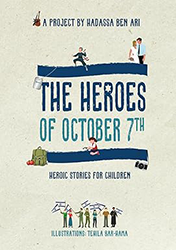The Upside Down Boy and the Israeli Prime Minister is an unusual book, filled with gentle lessons while telling a story sure to make a reader smile.
Daniel lives in Israel. He is one of those admirable, wonderful kids who just has trouble sitting still; he wants to do things his own way and sometimes that way includes dramatic physical poses and incessant motion. His teacher and parents are understanding but try to convey the message that sometimes bouncing around a room and standing on one’s head are not appropriate to the time and place.
A class field trip to the Prime Minister’s office is planned and Daniel is encouraged, reminded, and warned to behave properly and to comport himself with dignity while on the trip. He is asked to reflect glory on his school, rather than embarrassment or discomfort. He tries hard to comply and succeeds for a while — until the guide, an assistant to the prime minister, drops a coin. Daniel, in an effort to be polite and helpful, attempts to retrieve it but then finds himself standing on his head.
The unflappable assistant leads the class to a framed picture of Israel’s first Prime Minister, David Ben Gurion, hanging on the wall. In the picture, Ben Gurion, a practitioner of yoga, is standing on his head at the beach. The guide then flips into his own headstand, assuring Daniel and the rest of the class that standing on one’s head seems to be excellent training for those who hope to someday run for the office of prime minister. The successful trip is capped by a special treat of upside down cake!
The illustrations are filled with color and movement, as well as realistically quirky facial expressions which reflect the text. The humor in the story shines through the illustrations while not eclipsing the message that the ability to see things differently has value.
Israel is a place where looking at issues from unusual perspectives is admired and encouraged. The reader empathizes with Daniel’s effort to restrain himself, while celebrating the freedom and creativity which is a hallmark of Israeli society. This story, while both fun and funny, reminds us all to be less hidebound and rigid. Readers learn to understand one facet of Israeli society while they are happily amused and entertained. This story is recommended for its lighthearted approach to Israeli history and society.
Michal Hoschander Malen is the editor of Jewish Book Council’s young adult and children’s book reviews. A former librarian, she has lectured on topics relating to literacy, run book clubs, and loves to read aloud to her grandchildren.





